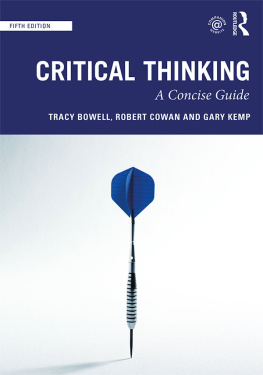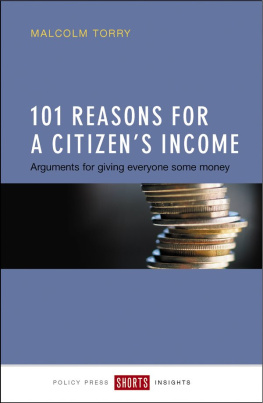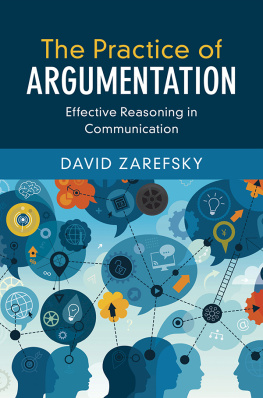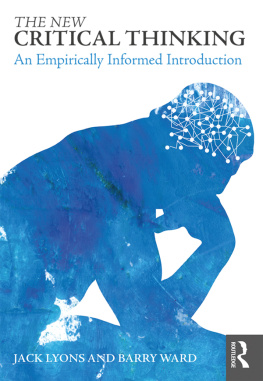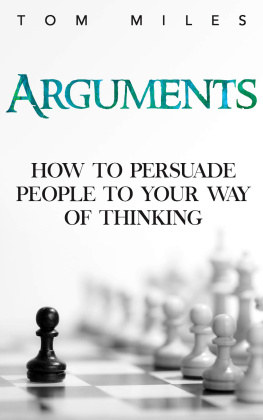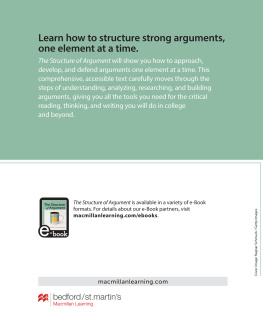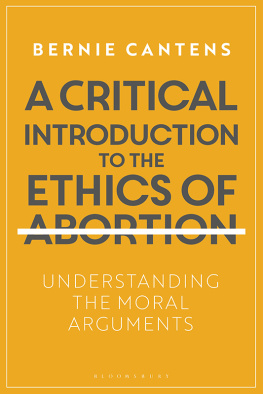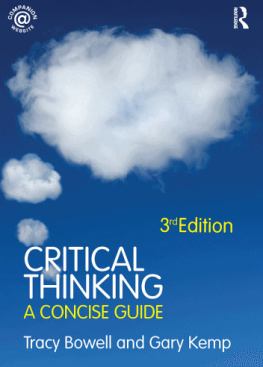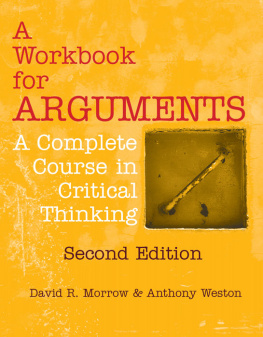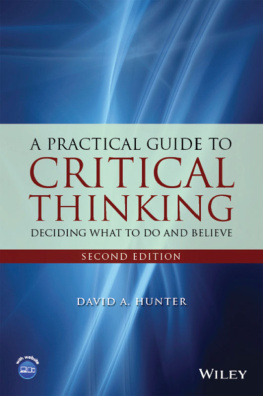Table of Contents
Guide
Print Page Numbers
critical thinking
We are frequently confronted with arguments. Arguments are attempts to persuade us to influence our beliefs and actions by giving us reasons to believe this or that. Critical Thinking: A Concise Guide will equip students with the concepts and techniques used in the identification, analysis and assessment of arguments, whatever the subject matter or context. Through precise and accessible discussion, this book provides the tools to become a successful critical thinker, one who can act and believe in accordance with good reasons, and who can articulate and make explicit those reasons.
Key topics discussed include:
Core concepts in argumentation;
How language can serve to obscure or conceal the real content of arguments;
How to distinguish argumentation from rhetoric;
How to avoid common confusions surrounding words such as truth, knowledge and opinion;
How to identify and evaluate the most common types of argument;
How to distinguish good reasoning from bad in terms of deductive validity and induction.
This fifth edition has been revised and extensively updated throughout, including a significantly expanded range of complete examples, the introduction of Venn diagrams and the discussion of fake news and related phenomena arising in the contemporary scene.
The dynamic Routledge Critical Thinking companion website provides thoroughly updated resources for both instructors and students, including new examples and case studies, flashcards, sample questions, practice questions and answers, student activities and a testbank of questions for use in the classroom. Visit www.routledge.com/cw/bowell.
Tracy Bowell is Associate Professor in Philosophy and Pro Vice-Chancellor Teaching and Learning at the University of Waikato, Aotearoa/New Zealand.
Robert Cowan is Lecturer in Philosophy at the University of Glasgow, UK.
Gary Kemp is Senior Lecturer in Philosophy at the University of Glasgow, UK.
Reviews of the previous edition
The way in which this text combines clear and detailed explanations of technical concepts with a comprehensive set of contemporary and relevant examples is excellent. Whilst the focus is largely on developing the practical skills of argument reconstruction and analysis, the authors never lose sight of the larger philosophical picture, and this makes the book a joy both to teach with, and to learn from.
Joel Walmsley, University College Cork, Ireland
Critical Thinking is the best textbook by some distance for undergraduate students approaching the subject for the first time. It is clearly written and introduces the fundamental concepts of the subject in an accessible and systematic way. The fourth edition contains welcome new material on probabilistic reasoning, as well as continued improvements throughout the book. It remains the clear first-choice textbook for my course.
Graham Stevens, University of Manchester, UK
The book is still the best guide around to the habits of reflective argument reconstruction and assessment that undergraduate philosophy majors are expected to form.
Steven Jauss, University of Arkansas at Little Rock, USA
Reviews of earlier editions
This concise guide offers relevant, rigorous and approachable methods. The authors focus on analysing and assessing arguments in a thoughtfully structured series of chapters, with clear definitions, a glossary, plenty of examples and some useful exercises.
Will Ord, Times Educational Supplement
In my view this is the most useful textbook on the market for its stated audience. It provides exceptionally clear explanations, with sufficient technical detail, but without over-complication. It is my first-choice text for teaching critical thinking to first-year undergraduate students.
Dawn M. Wilson, University of Hull, UK
This is the best single text I have seen for addressing the level, presumptions, and interests of the non-specialist.
Charles Ess, University of Oslo, Norway
TRACY BOWELL,
ROBERT COWAN
and
GARY KEMP
critical thinking
A CONCISE GUIDE
FIFTH EDITION

Fifth edition published 2020
by Routledge
2 Park Square, Milton Park, Abingdon, Oxon OX14 4RN
and by Routledge
52 Vanderbilt Avenue, New York, NY 10017
Routledge is an imprint of the Taylor & Francis Group, an informa business
2020 Tracy Bowell, Robert Cowan, and Gary Kemp
The right of Tracy Bowell, Robert Cowan and Gary Kemp to be identified as the authors of this work has been asserted by them in accordance with sections 77 and 78 of the Copyright, Designs and Patents Act 1988.
All rights reserved. No part of this book may be reprinted or reproduced or utilised in any form or by any electronic, mechanical, or other means, now known or hereafter invented, including photocopying and recording, or in any information storage or retrieval system, without permission in writing from the publishers.
Trademark notice: Product or corporate names may be trademarks or registered trademarks, and are used only for identification and explanation without intent to infringe.
First edition published by Routledge 2002
Fourth edition published by Routledge 2015
British Library Cataloguing-in-Publication Data
A catalogue record for this book is available from the British Library
Library of Congress Cataloging-in-Publication Data
Names: Bowell, Tracy, 1965- author. | Kemp, Gary, 1960 October 15- author.
Title: Critical thinking : a concise guide / Tracy Bowell, Robert Cowan, and Gary Kemp.
Description: Fifth Edition. | New York : Routledge, 2019. | Includes bibliographical references and index.
Identifiers: LCCN 2019008471| ISBN 9780815371427 (hardback : alk. paper) | ISBN 9780815371434 (pbk. : alk. paper) | ISBN 9781351243735 (e-book)
Subjects: LCSH: Critical thinking. | Critical thinking--Study and teaching. | Language and logic. | Reasoning.
Classification: LCC B809.2 .B69 2019 | DDC 160--dc23
LC record available at https://lccn.loc.gov/2019008471
ISBN: 978-0-8153-7142-7 (hbk)
ISBN: 978-0-8153-7143-4 (pbk)
ISBN: 978-1-351-24373-5 (ebk)
Typeset in Berling
by Wearset Ltd, Boldon, Tyne and Wear
Visit the companion website: www.routledge.com/cw/bowell
CONTENTS
Like all authors of texts on critical thinking or critical reasoning, we have tried to write a book that is genuinely useful useful for the practice as opposed to the theory of critical thinking. But our conception of what is useful differs somewhat from that of most of those authors.
On the one hand, we have largely avoided formal methods. Whereas the application of formal methods is justified primarily by its value in coping with complex logical structure, the logical structure of everyday argumentation is very seldom so complex that an arguments validity, or lack of it, cannot be revealed to ordinary intuition by a clear statement of the argument in English. Yet no formal means short of the first-order predicate calculus is sufficient to represent the logic of the majority of everyday arguments. Rather than compromising by presenting less-comprehensive formal methods that are useful only in a narrow range of cases, we have largely avoided them, except for brief sketches for the sake of those interested in seeing how what they are learning connects with formal logic and probability theory.

